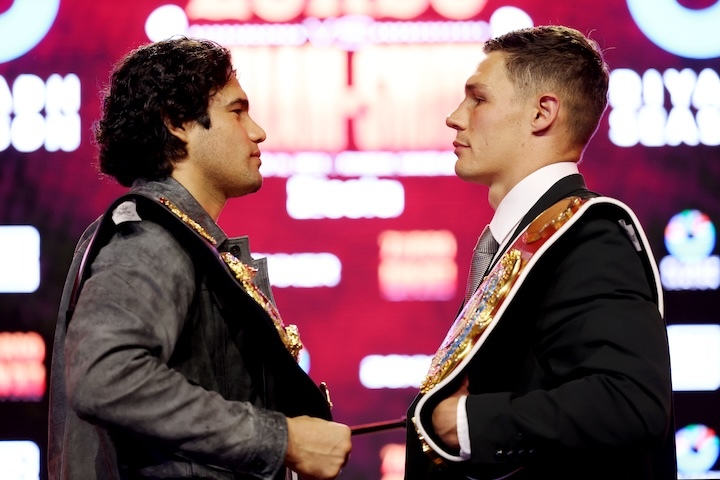Boxing has found openings in this post-World Series, football-season window to still stage some landmark U.S.-based fights in recent years.
Deontay Wilder-Tyson Fury 1 in December 2018, Canelo Alvarez-Sergey Kovalev in November 2019, Fury-Wilder 3 in October 2021, Juan Francisco Estrada-Roman “Chocolatito” Gonzalez in December 2022 and Rafael Espinoza-Robeisy Ramirez 1 in December have each provided reminders that the sport isn’t bound to a set schedule.
Now, as an increasing number of major bouts have been produced and staged because of the riches in Saudi Arabia, the late 2024 U.S. boxing schedule has been minimized.
Beyond Saturday’s Robson Conceicao-O’Shaquie Foster WBC super-featherweight title rematch in Verona, N.Y., there’s next week’s likely sweep by welterweight champion Jaron “Boots” Ennis and super-flyweight champion Jesse “Bam” Rodriguez in Philadelphia along with the December 7 WBO super-featherweight rematch between champion Emanuel Navarrete and two-division champion Oscar Valdez and Espinoza-Ramirez 2 in Phoenix.
Is that enough?
Or is the defection of late-fall, early winter bouts like last month’s Artur Beterbiev-Dmitry Bivol light-heavyweight unification (Saudi Arabia), the Nov. 16 “Latino Night” showcase (Saudi Arabia), the Fury-Oleksandr Usyk heavyweight unification rematch (Saudi Arabia) and undisputed super-bantamweight champion Naoya Inoue’s return (Tokyo) reason for alarm?
“They usually save some blockbusters for the end of the year and we’re used to having everything in the U.S., everything in Las Vegas,” former welterweight champion Paulie Malignaggi said on an episode of ProBox TV’s “Top Stories” this week. “All of a sudden, I’m naming fights elsewhere. The American schedule has dwindled down. That’s what it’s starting to be.”
Malignaggi’s fellow analyst, Chris Algieri, said he’s not bothered that the global sport is exerting its reach, adding Americans “don’t go to the fights anyway.”
Yet, when a card like Golden Boy Promotions’ November 16 show that seems a natural for the Southwestern U.S., ends up in beer-less Riyadh, Saudi Arabia, heads deservedly are being scratched.
“They wanted to build up the fights in Saudi … if you’re paying everybody, you should bring them over,” Algieri said.
The card is headlined by the cruiserweight unification between Mexico’s Gilberto “Zurdo” Ramirez versus Chris Billam-Smith, with former 140-pound champion Jose Ramirez meeting unbeaten fellow Californian Arnold Barboza and Mexico’s top-rated lightweight contender William Zepeda fighting former 130-pound champion Tevin Farmer.
Alalshikh attempted an August 3 fight card in Los Angeles and it resulted in weak ticket and pay-per-view sales.
“Will we have another? Probably not,” Algieri assessed.
But taking so much elite boxing out of the world’s richest nation is a transition worth watching, as the time difference leaves bouts like Beterbiev-Bivol and Usyk-Fury 2 on American afternoons, when sports television viewership is typically locked in on football.
Usyk-Fury 2 will coincide with the first college football playoff games and special Saturday NFL games, further dampening the number of eyes on the heavyweights.
While the concern over that has been dismissed by some over the Saudis’ apparent limitless wealth, the Financial Times reported this week that Saudi Arabia’s wealth fund is reducing its international investments from a high of 30 percent in 2020 to between 18 and 20 percent moving forward.
The focus on the domestic economy is a result of a decline in oil revenues, according to Financial Times.
For now, Malignaggi said on the heels of two Canelo Alvarez fights this year and the expected January pay-per-view return of popular lightweight champion Gervonta “Tank” Davis, the current U.S. lull is “just scheduling … I’m not sure anything’s being lost. You could say some things have moved to Riyadh. I wouldn’t say it’s something crazy.”
Inoue has rejected the notion that he should feel obligated to fight in the U.S., given his ability to sell out the 55,000 Tokyo Dome earlier this year.
There is, however, a plan to bring Inoue to fight in Las Vegas in April.
While American and English promoters have balked at making some high-profile cross-promoted bouts over financial, pride and broadcast factors on their turf, Alalshikh has paid handsomely to make fights including the Usyk-Fury matches, Beterbiev-Bivol and perhaps a bout pitting four-division champions Alvarez and Terence Crawford.
But the sanitized conditions in Saudi Arabia have zapped some of the life from the crowds there, and deprived boxing-mad locales such as Los Angeles, Las Vegas, New York and Phoenix of cards that could also generate impressive revenue with more favorable broadcast times.
Algieri said the Saudi Arabia money is more robust and is naturally “going to pull fights – fights that weren’t getting made (in the U.S.) anyway. I’m not mad about it.”
Saudi Arabia is also planning to host a February 22 card.
“Now, you go to where the money is,” Malignaggi said. “As long as (the fights) are happening, it’s better that they happen over there then not happen at all.”


ADD COMMENT VIEW COMMENTS (4)